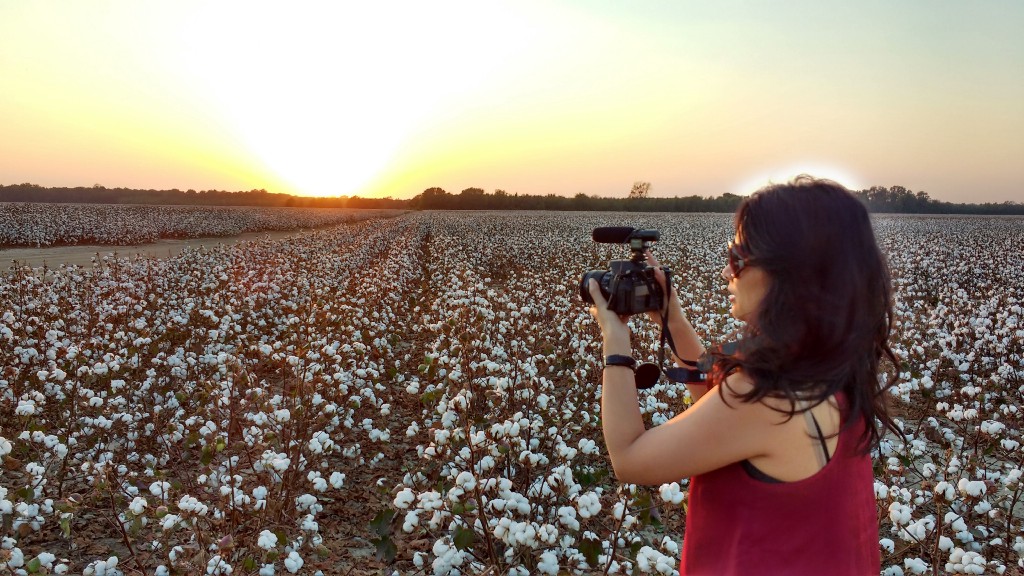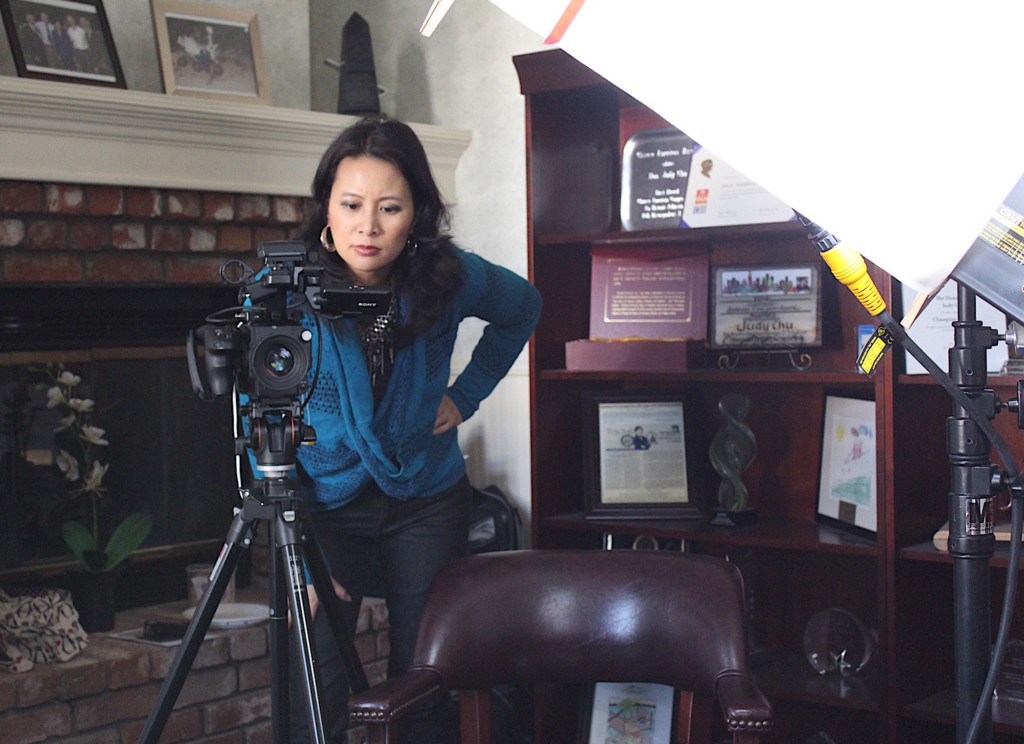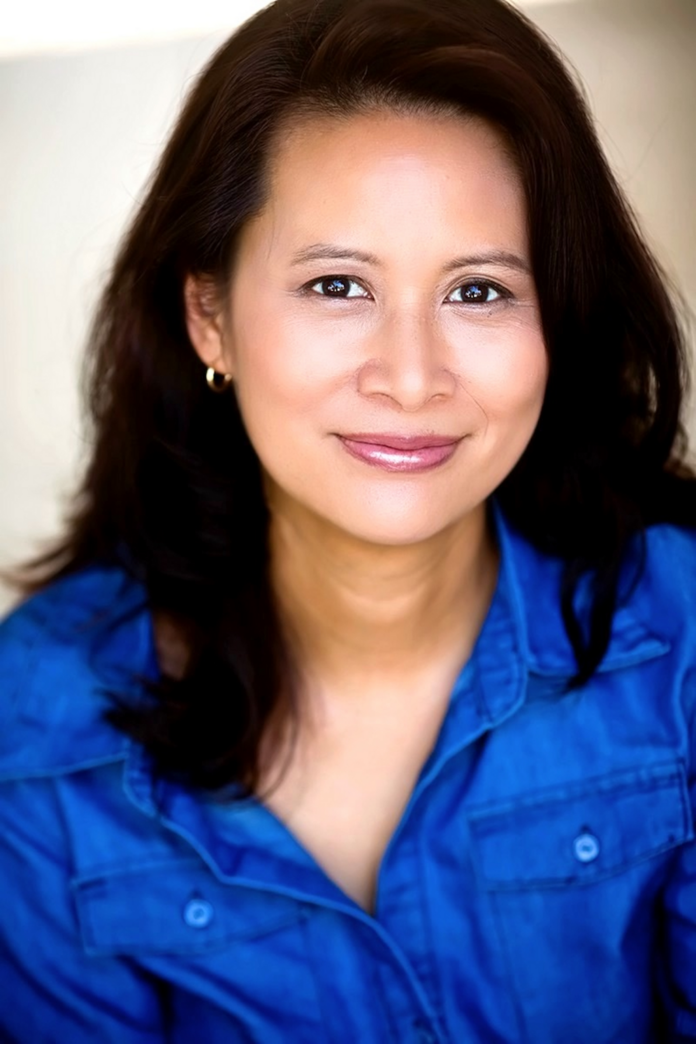Filmmakers Making A Social Impact: Why & How Filmmaker Larissa Lam of Giant Flashlight Media Is Helping To Change Our World
I hope when future generations learn about the American South, they will know that there was more to the story than just black and white. I believe educating students and the public about the significance of Asians in America is a major key in battling racism and xenophobia.
As a part of our series about “Filmmakers Making A Social Impact” I had the pleasure of interviewing Larissa Lam.
Larissa Lam directed the award-winning World Channel/PBS documentary Far East Deep South and the acclaimed short film, Finding Cleveland. She was previously part of the Smithsonian’s History Film Forum Emerging Filmmakers Lab and has been featured on NBC News and in the Los Angeles Times. She is also an accomplished music composer and songwriter who has written music for The Oprah Winfrey Show, the films Gone and Zulu among other projects.
Thank you so much for doing this interview with us! Before we dive in, our readers would love to get to know you a bit. Can you share your “backstory” that brought you to this career?
Growing up in Diamond Bar, CA as the only daughter of Chinese immigrants, I thought I would become a doctor like my father. When I broke the news to my family that I wanted to pursue a career in entertainment, my parents thought I would starve. I was told I would not gain acceptance in a predominantly non-Asian industry. However, I think the challenge to overcome the odds motivated me to go into entertainment and increase Asian American representation in that industry. I got my degree in Business Economics from UCLA and became the Chief Financial Officer of a record company. From there I worked mainly in the music business but I also got involved with producing television. About seven years ago, I took a fateful trip to Mississippi with my husband’s family in search of his grandfather’s gravesite. On that trip is where I uncovered the little-known history of Chinese families, like my husband’s, that lived in the Mississippi Delta during segregation. It was history that I thought was important to tell and I decided to make documentary films about the subject.
Can you share the funniest or most interesting story that occurred to you in the course of your filmmaking career?
My husband and I were walking on the red carpet at a film festival when a reporter turned to my husband and said, “Obviously, you must be the director of the film.” I promptly corrected her and said “No, I am.” Sadly, there’s still a lot of gender bias against female directors. I would say eight out of ten times people assume my husband is the director and not me.
Who are some of the most interesting people you have interacted with? What was that like? Do you have any stories?
When I was making my film, Far East Deep South, I was struck by the Southern hospitality I received. Levon Jackson, the mayor of the small town of Pace, MS, invited my crew and me over for some very tasty ribs at his house. I was so stuffed from eating that I almost didn’t want to go back to work filming. He actually cooked the ribs himself and this was the first time we met him. What was even more amazing was the history he shared with us about the interconnected relationship the Black and Chinese families had in the Mississippi Delta during segregation. His town was filled with predominantly African American residents and a few Chinese. Both communities were not allowed to live in white neighborhoods during the Jim Crow era and there was a mutual respect between the communities.
What are some of the most interesting or exciting projects you are working on now?
Far East Deep South, is about my father-in-law’s family. Now, I am starting to research my mother-in-law’s side of the family. We recently found out that her grandfather was a Transcontinental Railroad worker and later moved to Denver, CO. However, he left the U.S. to see his family in China and was subsequently barred from returning to the U.S. because of the Chinese Exclusion Act of 1882. There’s a lot of hidden history about the Chinese community in Denver that I look forward to digging up. My husband and I also host a podcast, Love, Discovery and Dim Sum, which helps people discover more history and an Asian American perspective on race and culture. We talk about current events that impact Asian Americans and try to add some historical perspective to it.
Which people in history inspire you the most? Why?
Through the course of my research for my films, I discovered all the unheralded Asian American trailblazers like Dr. Mabel Lee. She was a leader in the women’s suffrage movement in New York and had attended Barnard College. She was a strong advocate for voting rights for women. Even though Dr. Lee helped women gain the right to vote, she was not even eligible to vote due to the Chinese Exclusion Act. That law prohibited anyone who was Chinese from becoming a naturalized U.S. citizen until its repeal in 1943. I admire her leadership and strength to go against societal norms to improve the lives of women.

Let’s now shift to the main focus of our interview, how are you using your success to bring goodness to the world? Can you share with us the meaningful or exciting social impact causes you are working on right now?
It’s been disheartening to see the rise in anti-Asian sentiment and hate crimes during the pandemic. It is my hope that telling personal and emotionally affecting stories can change people’s hearts and minds. Unfortunately, hearing people tell anyone who looks Asian to “go back to your country and you don’t belong here” is not a new phenomenon but has been a recurring theme throughout history. As Asians living in America, we wrestle with our identity and sense of belonging no matter how long our families have been here.
Our struggles and contributions have been a significant part of American history yet have been largely invisible in media and rarely taught in schools. As a result, we are treated as perpetual foreigners and outsiders. That is largely why I felt compelled to make films that hopefully can help people gain a new perspective on Asian Americans. After seeing my films, I hope more people realize Asian American families have a long legacy in this country and were an integral part of American society. I also hope that American history lessons will be more inclusive of the Asian American experience, especially as it pertains to learning about the American South. We all learn about segregation but we don’t learn that the Chinese in the South and other communities of color were also subject to Jim Crow laws.
I hope when future generations learn about the American South, they will know that there was more to the story than just black and white. I believe educating students and the public about the significance of Asians in America is a major key in battling racism and xenophobia. Part of our efforts includes a campaign called the First Class Initiative where we will show Far East Deep South in underfunded schools and help bring these important history lessons to classrooms for the first time. It’s a tall task but I’m committed to transforming the way history is taught because American history should include all of us.
Many of us have ideas, dreams, and passions, but never manifest it. But you did. Was there an “Aha Moment” that made you decide that you were actually going to step up and take action for this cause? What was that final trigger?
The first trip I took with my husband’s family to Mississippi was when the lightbulb turned on over my head. I grew up in California and took AP U.S. History. Nowhere in my history class did we ever learn about Chinese being in the South. We barely learn about any other Asian American history aside from railroad workers and Japanese internment camps. When I walked into the Mississippi Delta Chinese Heritage Museum and saw all the exhibits of Chinese families over the generations being displayed, I kept thinking about how others needed to know this history. I took the initiative and decided to make documentaries about it.
Can you tell us a story about a particular individual who was impacted or helped by your cause?
Recently, a high school history class in Oregon watched Far East Deep South, and it really changed the perspective of the students who were predominantly non-Asian. Many of the students commented how they never knew that the Chinese faced so much discrimination in this country. One student said, “I had never learned about the systemic discrimination of Asian-Americans until now. I was unaware that segregation affected Asians. It makes me wonder what else I haven’t been taught.” So much history of Asians in America has been left out and my goal has been to use films to show that history. Now, the students who learn that history can tell others about that history. It hopefully gives them greater empathy for communities of color and immigrant families.
Are there three things that individuals, society or the government can do to support you in this effort?
First, I would love help in bringing our film, Far East Deep South, into more schools. If you know of teachers or schools who should know about our film and this history, please visit our education distributor’s website newday.com or contact us through our website fareastdeepsouth.com.
Second, I hope my film can be a catalyst for conversation on how to reduce racism and xenophobia. If you know of companies and organizations that would like to host a screening and discussion of our film, please reach out.
Third, I would like museums, libraries and those who tell public history to be more inclusive of the Asian American experience all year long. Stories like ours should not be told only during Asian American Pacific Islander Heritage Month in May. These stories matter all the time.

What are your “5 things I wish someone told me when I first started” and why. Please share a story or example for each.
- It is not an equal playing field. In entertainment, women and people of color are often overlooked when being considered for leadership positions or underestimated when they do hold top positions. When I was the Chief Financial Officer of a record label, I would go to meetings representing my company and I would largely be ignored. People assumed my male co-workers were the ones in charge until they found out that I was the one writing the checks. Then, people started paying attention.
- There are no rules. Every person has a different career path. Just because something hasn’t been done before, doesn’t mean it can’t be done. I am an Asian American woman who became a recording artist, music composer and documentary filmmaker. You don’t normally see that combination but I proved it can be done.
- You aren’t limited to one thing. The career or job you start with isn’t the only one you will have. I have been a CFO, singer, music composer, TV host and filmmaker. There may be other job titles I acquire down the line as I still have a lot of life to live.
- Don’t feel guilty if you have a competitive advantage. I used to naively think that I should just be evaluated purely on my talent and skills. Way back in the early days of my career, I took part in a local karaoke singing competition. I felt guilty that I knew one of the judges because they were family friends. I considered dropping out because I didn’t think it was fair even though there was nothing in the rules that prohibited contestants from knowing the judges. However, when it came time to compete, I saw one of the other contestants waving to the judges because he knew them. I realized in that moment that if I didn’t have that advantage, then someone else would.
- Get to know decision-makers. Sometimes companies like film studios or distributors can seem intimidating to approach. At the end of the day, they are run by people. It’s important to make a personal connection to someone at a company, even if it’s an assistant. Sometimes, it’s the assistant that makes the decision of whether or not the executive they work for will take your call. I used to be an intern for a top executive at Columbia Records. Guess who screened their calls? If someone took the time to be courteous and get to know me, I was more likely to make their message a higher priority for my boss.
If you could tell other young people one thing about why they should consider making a positive impact on our environment or society, like you, what would you tell them?
If you see something that you feel is unjust or needs to be fixed, don’t wait for someone else to address the problem. You can take the initiative to make a difference regardless of how old you are.
We are very blessed that many other Social Impact Heroes read this column. Is there a person in the world, or in the US, whom you would like to collaborate with, and why? He or she might see this. 🙂
Lin-Manuel Miranda. I love what he did with Hamilton to allow people of color to see themselves in history. He is also such a staunch proponent of diversity and representation. At my core, I’m a musician and storyteller like him and I would love to collaborate with him to help amplify Asian American stories. I’m also a big Garfield fan and I heard he’s a big Garfield fan.
Can you please give us your favorite “Life Lesson Quote”? Can you share how that was relevant to you in your life?
“Therefore, do not worry about tomorrow, for tomorrow will worry about itself. Each day has enough trouble of its own.” This quote is from the book of Matthew 6:34 in the Bible and as a creative, I never know where my next paycheck is coming from. I just trust that God will provide for me each day.
How can our readers follow you online?
You can find me on Twitter and Facebook @LarissaLam and on Instagram @LarissaLamMusic. You can also find my website LarissaLam.com
This was great, thank you so much for sharing your story and doing this with us. We wish you continued success!
Filmmakers Making A Social Impact: Why & How Filmmaker Larissa Lam of Giant Flashlight Media Is… was originally published in Authority Magazine on Medium, where people are continuing the conversation by highlighting and responding to this story.


